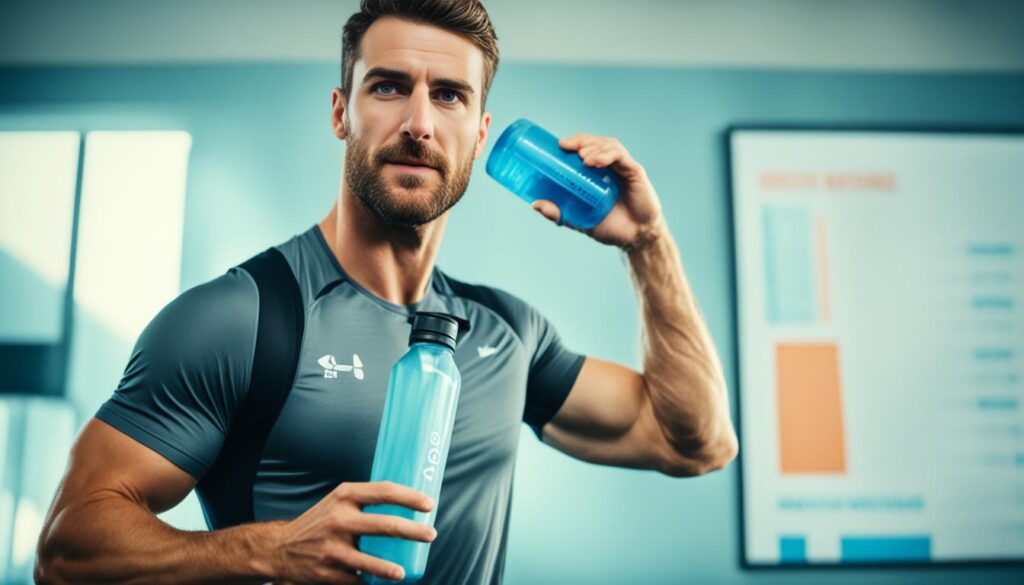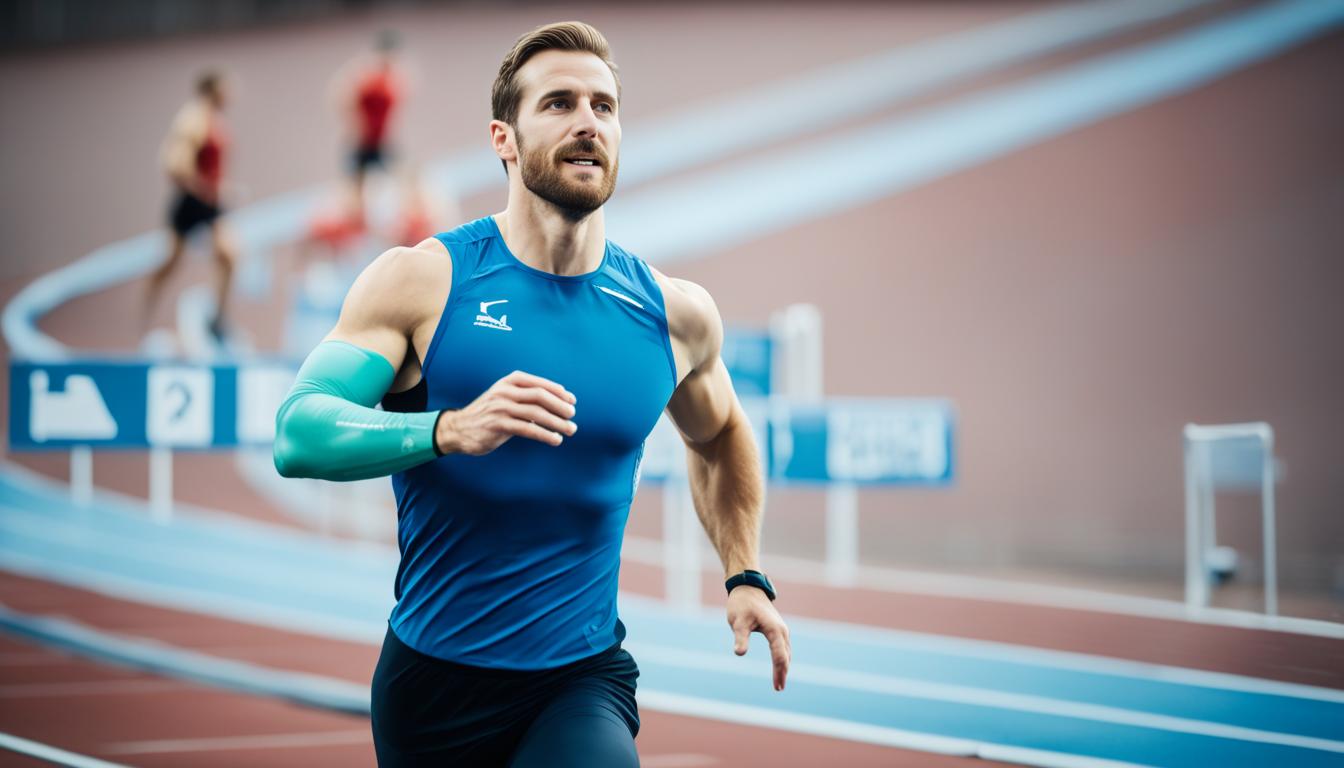Athletes are always aiming for the top. Staying hydrated plays a big role in this quest. Whether on the track or field, optimal hydration is crucial for both success and health. Here, we’ll explore effective athlete hydration strategies based on science. These methods boost performance and recovery.
The drive to win, whether in a sprint or a marathon, highlights the need for proper hydration. It’s more than just drinking water. Athletes must replenish electrolytes to keep their muscles working hard. The approach to sports hydration is changing. Now, athletes and coaches must upgrade their hydration know-how for peak results.
The Role of Hydration in Athletic Performance and Recovery
Keeping up with sports hydration goes beyond quenching thirst. It’s key for an athlete’s performance and recovery. The link between being hydrated and an athlete’s maximum performance has been widely studied. We’ll look at how not drinking enough water affects muscles, the role of hydration in avoiding injuries, and how knowing about hydration can boost an athlete’s performance.
Understanding the Impact of Dehydration on Muscle and Anaerobic Capacity
Not drinking enough water greatly affects an athlete’s strength, power, and anaerobic ability. Losing fluids leads to less muscle power, critical in many sports but especially in track and field. To fight off these problems, athletes should follow strong hydration tips for athletes. These tips should cover how to stay hydrated during and after hard workouts or competitions.
Preventing Injury and Enhancing Recovery through Proper Hydration
Moreover, post-workout hydration is crucial for preventing injuries and speeding up recovery. Drinking enough helps the body heal and lowers the chances of muscle cramps and injuries from tiredness. By focusing on rehydrating, athletes can recover better from tough exercises and avoid injuries that could sideline them for a while.
Hydration Knowledge, Attitudes, and Practices among Athletes
Even though hydration’s benefits are well-known, many athletes still need to learn more about it. They need to know how much to drink, recognize dehydration signs, and understand what their drink options are. Coaches and health experts have the job of teaching athletes how to hydrate properly. This is based on each athlete’s body and the environment they train in.
Hydration Strategies for Enhanced Athletic Endurance
Hydration is key for athletes to keep their endurance up. The National Athletic Trainers’ Association says being well-hydrated when you start your workout is crucial. They also stress the importance of drinking enough to make up for what you lose in sweat and pee. This helps to avoid losing more than 2% of your weight during exercise.

When it comes to hydrating for sports, what you drink is just as crucial as how much you drink. Alkaline mineral water might help athletes keep up their performance longer. It’s important to remember that hydration plans should be made for each athlete’s needs. This includes looking at their weight, how much they sweat, and the weather.
Changing your hydration plan suddenly before a big event is not a good idea. It could hurt your performance. Below are basic hydration tips for endurance sports.
| Activity Phase | Hydration Goal | Fluid Type |
|---|---|---|
| Pre-activity | Ensure pre-exercise euhydration | Preferably water or sports drink |
| During activity | Match fluid intake with losses | Water for short-duration; sports drink containing electrolytes for long sessions |
| Post-activity | Replenish any fluid deficit | Water, electrolyte solution, or recovery drinks as needed |
In the end, having a solid hydration plan is crucial for athletes who want to stay at their best. By knowing their needs and planning ahead, they can get hydration right. This is essential for their best performance.
Sports Hydration: Best Practices and Common Misconceptions
It’s not just about drinking water for athletes. A full plan for fluid and electrolyte balance is key. In sports hydration, there are proven methods to boost performance. And there are wrong beliefs that can harm an athlete’s health and success.
Guidelines for Fluid Intake Before, During, and After Exercise
Athletes should start hydrated. It’s advised to drink fluids steadily every 20 minutes during activity. After exercise, it’s crucial to keep drinking to replace fluids lost.
The Importance of Electrolytes for Athlete Hydration
Water matters a lot, but don’t forget about electrolytes for athletes. Minerals like sodium and potassium help keep fluids balanced and muscles working. Every athlete’s plan should include electrolytes, especially if they sweat a lot.
Assessing Individual Hydration Needs and Overcoming Barriers
Knowing your own hydration needs is key for athletes. Use training time to adjust your hydration plan. Learn how to check if you’re well-hydrated.
| Hydration Phase | Best Practices | Misconceptions to Avoid |
|---|---|---|
| Pre-Exercise | Drink adequately, aim for light yellow urine color | Assuming thirst means dehydration |
| During Exercise | Replenish fluids every 20 minutes | Waiting to drink until thirsty |
| Post-Exercise | Continue rehydrating, monitor urine color | Ignoring or underestimating post-activity fluid needs |
| Electrolytes | Tailor beverage choice to individual sweat and electrolyte loss | Relying solely on water for rehydration |
Hydration for Athletes: When and What to Drink
Getting the timing, quantity, and type of drinks right can boost an athlete’s performance. By fine-tuning their hydration strategies to fit their activities, athletes can stay in top form and recover faster. It’s key to add electrolytes for athletes during long or intense workouts.
A good pre-exercise hydration plan begins well before starting the activity. Drinking 24 ounces of water at least two hours before helps prep the body. But it’s not just about drinking before the activity; during it, replacing fluids and electrolytes is crucial.
- Athletes should drink every 20 minutes during exercise to keep their performance steady.
- Choosing drinks with electrolytes helps keep energy up and prevents imbalance.
- Hydration tips for athletes mention choosing sports drinks with low or no sugar when possible.
After working out, a smart post-workout hydration plan is vital. Drinking 16-24 ounces of fluids helps replace what was lost through sweat. This step is important for less muscle soreness and quicker recovery. Below is a guide with suggested hydration amounts for different types of sports.
| Activity Type | Pre-Exercise Fluid Intake | Intra-Exercise Fluid Intake (every 20 mins) | Post-Exercise Fluid Intake |
|---|---|---|---|
| Endurance (e.g., Marathon) | 24 oz water | Electrolyte-rich sports drink | 16-24 oz sports drink |
| Strength Training | 24 oz water | Water or diluted sports drink | 16-24 oz water |
| High-Intensity Interval Training (HIIT) | 24 oz water | Electrolyte-replenishing drink | 16-24 oz electrolyte drink |
| Team Sports (e.g., Soccer, Basketball) | 24 oz water | Carbohydrate-electrolyte solution | 16-24 oz recovery drink |
It’s essential for athletes to tune into their bodies and tweak their fluid intake. This may depend on the weather, how hard the activity is, and how much they sweat. Being able to adjust and make smart hydration choices leads to better performance and faster recovery.

Conclusion
For athletes aiming for the top, mastering sports hydration is crucial. It’s the base of peak performance and swift recovery. Athlete hydration plans need to be as unique and rigorous as their training.
Looking for optimal hydration means going past just feeling thirsty. Science guides us to the right way to stay hydrated. It ensures you don’t lose performance because you’re not drinking right. Hydration for athletes and the right balance of electrolytes are key for muscle work and avoiding injuries.
“The fluid needs of athletes are as dynamic as the sports they play. Tailoring one’s hydration to the intensity, duration, and environmental context of their activity is a game-changer in athlete health and performance.”
A top athlete hydration strategy means sharing knowledge. It’s about a full approach that goes beyond just drinking water. It includes what you eat and other nutritional needs too.
| Hydration Component | Role in Performance | Strategies for Optimization |
|---|---|---|
| Fluid Intake | Directly influences blood volume and cardiovascular function. | Maintain a balanced intake throughout the day; do not wait for thirst as an indicator. |
| Electrolyte Balance | Essential for nerve transmission and muscle contraction. | Incorporate sports drinks or electrolyte supplements during prolonged activity. |
| Individual Sweat Rate | Determines the specific fluid needs during activity to offset dehydration. | Monitor and calculate sweat rate to customize rehydration volumes post-exercise. |
Sports hydration is always changing to meet different athletes’ needs. It’s founded on solid research. This approach sets new standards in how we view athletic success. Here, hydration is the silent key to winning.
(Additional Section Required by Outline)
For athletes aiming at peak performance, proper hydration is key. It’s not just helpful; it’s essential. This article has shown how good hydration helps with performance, recovery, and preventing injuries. Now, the challenge is to make these habits a part of an athlete’s daily life. Athletes in the United States need to work with their coaches and nutritionists. Together, they can create a hydration plan that fits their training needs and environment. It’s not just about drinking water. It’s about making every drink count for the athlete’s body balance.
Building a consistent hydration habit is crucial. Athletes should drink water not just during practice but all day. This helps keep a constant hydration level, ready to be adjusted for any workout or weather. They should also learn the signs their body gives when it needs water, which is more reliable than just feeling thirsty. By making hydration a part of their daily routine, athletes ensure they’re always ready to give their best performance.
In conclusion, getting hydration right needs dedication, learning, and commitment. Athletes must understand how vital proper fluid and electrolyte balance is. By doing so, they can boost their performance and career in sports. As they push towards their goals, being well-hydrated is a crucial ally on their journey to success.




